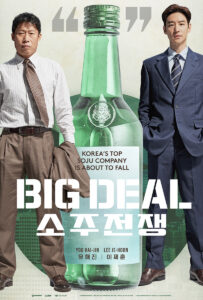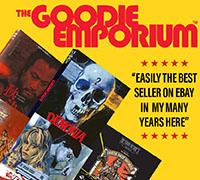Director: Choi Yoon-jin
Cast: Yoo Hae-jin, Lee Je-hoon, Byron Mann, Son Hyeon-ju, Choi Young-Joon, Kim Ki-Hae
Running Time: 104 min.
By Paul Bramhall
Watch any Korean movie from the last 30 years, and it won’t be too long before the ubiquitous green soju bottle (usually several of them) makes an appearance, the alcoholic beverage that’s remained the number one best selling hangover inducer in the world for almost as long. While soju has always played an integral part in Korean cinema – from the tipsy conversations of practically every Hong Sang-soo movie ever made, to the comedic mishaps in the likes of Daytime Drinking – Big Deal is certainly the first production that can label itself as a soju themed financial drama.
Spanning 6 years from 1997 to 2003, the plot takes its inspiration from the real-life story of Jinro Soju, which was acquired by Hite with a little help from Goldman Sachs in the late 90’s (check the back of any soju bottle in your local Korean restaurant or Asian supermarket, and chances are you’ll find it was made by Hite Jinro). For obvious reasons, in Big Deal the name of the soju brand is the fictional Gukbo, with the narrative opening in the midst of the Asian Financial Crisis. With Gukbo facing bankruptcy, the company president tasks the loyal financial director to work with a consultant from a global investment firm, with the latter promising they have the strategy to get Gukbo out trouble.
The CFO is played by Yoo Hae-jin (Yadang: The Snitch, Exhuma), bringing his typical mix of cheerful amicability to the role while hiding a sad past, with his unwavering dedication to the company costing his relationship with his wife and daughter. His dedicated company man is played off against the consultant he’s paired with, played by Lee Je-hoon (Escape, Time to Hunt), who after living overseas for 10 years views working as simply a way to make money, and can’t quite fathom why Hae-jin is so passionate about securing the future of Gukbo. But secure it Je-hoon he does, finding a way to offer the company a 5-year reprieve from debtors, while hiding the fact that behind the scenes he’s using his access to Gukbo’s financial records to set up a takeover by the investment firm he works for, the plan being to then sell it off for a significant profit.
Financial thrillers are a tricky proposition (see Herman Yau’s A Gilded Game for the perfect example of how not to do one), however in recent years Korean cinema has occasionally looked to the Asian Financial Crisis era for inspiration, with 2018’s Default also set during the period. While Default told the bigger picture of Korea’s negotiations with the International Monetary Fund when the country was on the brink of bankruptcy, comparatively Big Deal feels like a more intimate portrayal, instead using the crisis as a framework to focus on the relationship between Hae-jin and Je-hoon. Indeed there are times when the movie it most recalls is Pretty Woman, just minus the woman part. Je-hoon and Hae-jin’s relationship echoes the dynamic between Richard Gere as the detached businessman buying up faltering businesses, and Ralph Bellamy as the traditionalist, unwilling to let go of the company he’s dedicated his life to.
Does the world really need a Korean take on a side story from a 1990 Hollywood romcom? The odds feel stacked against it, however for the most part Big Deal works as an engaging character drama. It also feels like a distinctly Korean topic (a comment I also made about The Match that was similarly released in 2025 – could it be the Korean film industry is shifting back to more local tastes after years of targeting the global market?), as there’s no escape from the fact it’s the story of a soju company experiencing financial trouble, and the question of if it can be saved or not. It’s not going to be immediately relatable subject matter for overseas audiences, and there’s a lot of the inevitable soju talk of how “the taste is bittersweet, just like life”, however Hae-jin and Je-hoon make for a likeable pair, and their onscreen chemistry works well.
Outside of the pair though other characters don’t fare quite as well, with a supporting cast that occasionally dips into caricature territory. The number one guilty party is the casting of Steven Seagal regular Byron Mann (Belly of the Beast, A Dangerous Man), who plays one of the Chinese American executives in the investment firm Je-hoon works for. Wearing a smarmy villainous grin for the entirety of his time onscreen, liberally using the word “f*ck” in every other sentence, and generally hamming it up to pantomime like levels, there’s a glaring lack of subtlety to his portrayal that makes it impossible to take him seriously. As a trivial side note, while Big Deal marks Mann’s debut in a Korean production, he notably played the bad guy in the Park Joong-hoon starring Hollywood movie American Dragons from 1998.
The directorial debut of Choi Yoon-jin, who previously wrote the scripts for 2013’s Steel Cold Winter and 2014’s Office, for his first time helming a production Yoon-jin is also expectedly behind the script of Big Deal. There’s some welcome humor interspersed amongst the talk of bonds and creditors, with one particularly fun poke at how many feel soju brands all taste the same, as Je-hoon struggles to describe the taste of one of Gukbo’s latest concoctions. Due to his character having lived in New York for 10 years, the script understandably gives him plenty of lines in English, which unfortunately come across as a little too phonetic to feel authentic. While I always admire actors tackling a language that isn’t their own, when the result is that it reminds us precisely that it’s an actor delivering lines in a language they’re not used to, for the audience it breaks the immersion in the story, and that’s sadly the case here.
Despite these minor issues though, for the most part Yoon-jin displays an assured hand for his first time in the director’s chair, and shows a welcome level of restraint in keeping the runtime to a brisk 104 minutes. In a climate where it often feels like everything needs to be shown rather than simply suggested, it’s admirable that we never have to sit through any flashbacks of Hae-jin back when he was still living with his wife and daughter (and I confess I was expecting them!), instead letting his facial expressions show the regret he feels. There’s a simple joy in seeing an actor be allowed to act, and trust that their acting is enough to tell the story without explaining it through exposition (or throwing in pace deadening flashback sequences), and it’s refreshing to see such an approach in a directorial debut.
Admittedly some of the symbolism feels a little on the nose, none more so than how the likes of the company president and villainous lawyers all insist on sipping glasses of whiskey rather than soju. At one point I wouldn’t have been surprised if one of them declared “soju is too much of a working-class drink for our educationally superior tastes!” Thankfully the implication is kept visual, and at least most of the whiskey sipping is done by the stellar supporting cast. Son Hyun-joo (The Phone, Hide and Seek) is suitably entitled as the self-serving company president who inherited its riches from his parents, with almost every line he speaks related to how he can make himself richer. While his character may be two dimensional, he still imbues it with a few distinctive quirks, with the constant opening and closing of his Motorola flip phone to express frustration fleshing out his character in a way the script fails to do.
Surprisingly Big Deal opts for more of a low key ending over any kind of corporate histrionics, a decision that works in its favour, with Yoon-jin using a post-credits sequence to show the passing of time from the closing scenes, one which offers up a satisfying coda on the simplicity of finding happiness. Transcending the financial drama label to end up more as a story of friendship and life lessons learnt, much like a bottle of soju after a long day at work, Big Deal hits the spot. Best of all, it’s only the former that leaves you with a headache the next day.
Paul Bramhall’s Rating: 7/10



